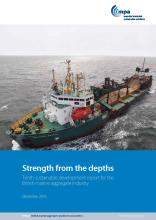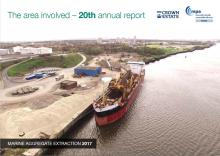The
Under this initiative, individual marine aggregate operators continue to report a wide range of data which, when combined, provides a comprehensive record of the sustainable development performance of the sector as a whole.
Sustainable development initiatives for industry sectors can be particularly challenging, as it can be difficult to obtain enough consistent data from member companies to be representative. The fact that the ninth annual report captures data from 75% of all marine aggregate production activity that occurred in UK waters during 2014, reflects the importance that BMAPA members place on this initiative.
The encouraging signs of economic recovery observed during 2013 were maintained into 2014, with total marine aggregate production increasing by 7.6%. In London and the South East of England, where one third of GB construction activity takes place and where traditionally marine supplies provide one third of all primary construction aggregate demand, landings increased by a healthy 13.8%. Along the Thames river, marine landings increased by 21%, reflecting the scale of growth and development that is currently taking place in our capital city.
A re-licensing programme for historic marine aggregate production licence areas was successfully completed during 2014.
Despite overall production increasing, the area of seabed actually dredged during 2014 reduced further, as operators introduced more detailed zoning arrangements for newly licensed areas.
Mark Russell, BMAPA director, said: “Throughout the challenging economic conditions, the marine aggregate sector has maintained its commitment to transparently reporting its performance across a range of indicators. This report demonstrates the real-world impact of the current economic climate on an important industry sector that provides essential construction materials to support future growth, while at the same time highlighting the industry’s continuing steps and progress to improve and enhance its sustainable development credentials.”







